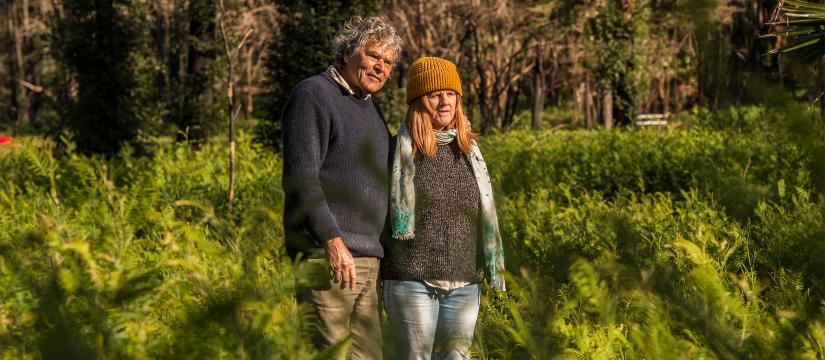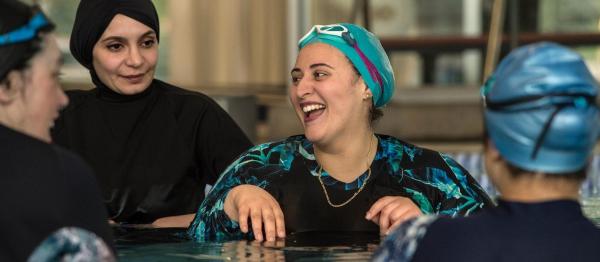
Rebuilding first the land, from the ground up -Indigenous teachers Noel and Trish Butler
“We've got a long way to go to share the knowledge of the longest living continuous culture known to humans,” says Noel, a local Budawang Elder from the Yuin Nation who has been a teacher for over 30 years. “We need Australians to take it up and value it. Everybody benefits knowing about the way we live and our culture. Sharing and looking after each other and looking after the land is something we'll never stop doing.”
Nura Gunyu – “swan country” in Noel’s native Dhurga language – was the Butlers’ idea of paradise. They planted thousands of plants and trees as food and shelter for native animals and birds, and taught thousands of Indigenous and non-Indigenous people of all ages about the land and people he knows so well. “We walked amongst our animals and our birds and our snakes – everything living here – without any fear of them or them without any fear of us,” says Noel. “We set it up how things should be.”
It’s not been easy for Noel and Trish who watched the powerful blaze demolish the lush rainforest they tended and nurtured – along with the diverse bush food plants and countless birds and animals that called it home.
The couple didn’t just lose their home and all of their possessions, Nuru Gunyu was incinerated. Seven buildings – including a commercial kitchen, sleeping quarters, large workshop, and toilet and shower blocks – plus water tanks and solar power systems were destroyed.
Noel and Trish were wiped out emotionally. But although the fires took everything they had, they couldn’t demolish their determination to rebuild.
They had to rebuild, explains Trish, because Nura Gunyu holds a significant place in Noel’s heart. “This is his country, this is his land,” she says. “This is where he grew up. He knows this area like the back of his hand. He belongs to the land and the land belongs to him.”
Learning to accept help
As difficult as it was for the Butlers to come to terms with the loss of their property and livelihood, they say the experience has helped them better understand the power of helping others.
At first, the couple said they didn’t want any help to rebuild Nura Gunyu. But it soon became clear that accepting help was just as important for others to come to terms with the loss. Locals, as well as hundreds from far-away Sydney and interstate, have donated plants, volunteered to dig holes and formed working bees to help the Butlers rebuild.
“It’s just overwhelming,” says Noel. “People are continually telling us how gratified they are for all we’ve done and what we've given to so many people. It’s why so many people turn up here – they want to help us get back on our feet. It gives other people satisfaction, knowing they've given us something back – that they've done something for us.”
Typically, Noel and Trish have put themselves last. “We're not rushing in to build a house at the moment because it's more important for us to get back to work,” he says. “Rebuilding our cultural centre is what we need.” Since December, they’re relied on the generosity of two retirees who have allowed them to stay in their rental house for free.
Noel says he has always been a “giver” – he loves doing things for other people. “I love giving out – especially knowledge and information. You know, knowledge is like a smile. Unless you’re going to stand in front of a mirror all day and look at yourself, smiling is no bloody good to you or anybody. But if you share it with somebody else, that person’s thought patterns change immediately.
“It might be something that can benefit them for the rest of their life. They can share it with their family and it goes on and on, like a pebble dropping in a pond. The ripples go out and out …”
Rebirth and recovery
Noel and Trish are seeing life slowly return to Nura Gunyu. Many of the eucalyptus and blue gums are resprouting. Noel, Trish and their many helpers have planted more than 1,500 plants and discovered native varieties they had never seen before. So far, they have welcomed a female kangaroo with its joey, a black snake, a wombat, about 10 bird species – all signs pointing to a promising future.
“Just straight after the fire, for the first few days, there were no birds,” says Trish. “The first thing we did was buy four grevilleas that were already flowering. Within half an hour, we had a brown honeyeater come down and feast on the nectar. It filled our hearts. When that bird came, we knew that was a sign for us to stay, move on and heal the land.
“Every day we go out there and we look at the plants, we look at the grass, we look at the water, we look at the birds and animal tracks. It's part of us; it's who we are.”
Noel says he’s always been taught the importance of making the most of your opportunities. If those opportunities don't arrive, you need to create them yourself.
“That’s what help is,” he says. “It’s somebody who cares enough to assist you make your situation, your circumstance or your life much better than what it was at the time. It's something that you can't do yourself – somebody else does it for you.
“I’ll keep giving and sharing what I know, and encourage other people to do it, too. I'll always keep on doing it … and we will have this place back.”

